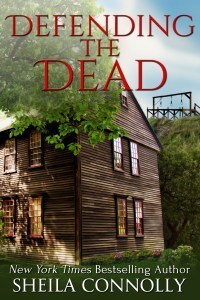Sherry Harris's Blog, page 21
May 8, 2015
Malice Memories
Last weekend, 5/6 of the Wickeds and all three of our accomplices were in Bethesda, Maryland at Malice Domestic, a fan conference that celebrates the cozy and traditional mystery novel. It is wicked and Wicked friendly. Lots of other writers, and lots and lots of readers.
We will probably touch on Malice a couple of times this month, but let’s start the conversation here: what new experience did you have this year at Malice? How did it go?
Edith: Two big new experiences. A – I was nominated for an Agatha Award for my short 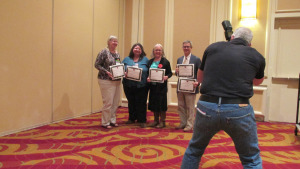 story, “Just Desserts for Johnny.” I didn’t win, but it was an honor and a thrill to be part of the illustrious group of nominees. B – I got to meet Sara Paretsky and tell her she was one of the reasons I started writing
story, “Just Desserts for Johnny.” I didn’t win, but it was an honor and a thrill to be part of the illustrious group of nominees. B – I got to meet Sara Paretsky and tell her she was one of the reasons I started writing 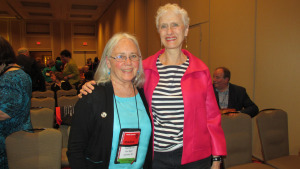 mysteries in the first place! She came and sat right next to me during the opening ceremonies. She’s a delightful, vigorous, articulate, progressive woman and one of my favorite authors. So pleased to have met her in person.
mysteries in the first place! She came and sat right next to me during the opening ceremonies. She’s a delightful, vigorous, articulate, progressive woman and one of my favorite authors. So pleased to have met her in person.
Liz: What a great time! This was my second year, and aside from getting to chat with some of my favorite readers and writers, a couple of things stand out: One, I was asked to jump in on an animal-related panel where they were missing a writer, and it was great fun. Two, I got to finally meet and chat with Dorothy Cannell – and I absolutely adore her! I want to go have tea with her now. Think she’ll invite me?
Jessie: I think the new thing for me this year was how not new it all felt. This is the fourth time I’ve attended and I was so pleased to look around and to see so many familiar faces. It felt like a reunion of sorts. Considering how much time is spent in solitude writing, it felt so lovely to thoroughly enjoy visiting with those kindred spirits I only get to see once a year and adding some new friends to the mix. I can’t wait until next year!
Sherry: As I started thinking over the weekend at Malice I realized I could write a whole blog on the topic. I finally met all the authors nominated for the Agatha Best First Novel panel. What a great group of women and authors, (find out more about them here) — being on a panel with them was a hoot. The picture below is my view from the panel.
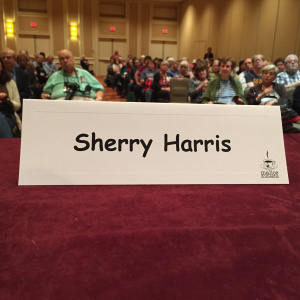
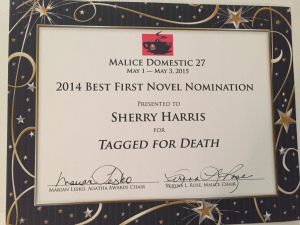 Then I met Sara Paretsky and told her how her books helped me through a difficult period in my life. I almost cried and Sara said she almost did too. Getting the certificate for the Best First at the opening ceremonies was unforgettable.
Then I met Sara Paretsky and told her how her books helped me through a difficult period in my life. I almost cried and Sara said she almost did too. Getting the certificate for the Best First at the opening ceremonies was unforgettable.
And nothing beats meeting readers, authors, old friends, and spending time with the Wickeds!
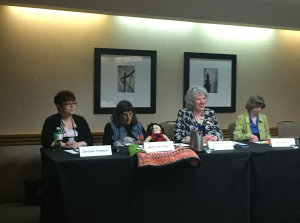 Julie: Well, new for me was moderating a panel. (Thanks Sherry for the photo!) It was a crafty cozy panel, and I loved the homework. Wonderful panelists, and a special hat tip to Molly MacRae who asked me what was next for me. Besides being kind, she is a riot. I also went to the Berkley/Obsidian dinner, and when I introduced myself and said my book was coming out in October, folks clapped. Thrilling. It wasn’t new to have my friends nominated for Agathas, but it was thrilling nonetheless. Great weekend!
Julie: Well, new for me was moderating a panel. (Thanks Sherry for the photo!) It was a crafty cozy panel, and I loved the homework. Wonderful panelists, and a special hat tip to Molly MacRae who asked me what was next for me. Besides being kind, she is a riot. I also went to the Berkley/Obsidian dinner, and when I introduced myself and said my book was coming out in October, folks clapped. Thrilling. It wasn’t new to have my friends nominated for Agathas, but it was thrilling nonetheless. Great weekend!
Readers, who else was at Malice? What stood out this weekend? And who’s planning on coming next year for the first time?
Filed under: Group posts Tagged: Agatha award Best Short Story, Malice Domestic, Sara Paretsky

May 7, 2015
It’s a Horizontal Life
by Barb Ross, who wishes she were out in the sunshine enjoying New England’s first sustained visit from spring.
But first, a word from our sponsor.
Randomly selected winners from their comments on Our Second Anniversary Blog post are: Ruth Nixon, Tiger Wiseman, Sandy Bartles, Jane Werthmann, Mary Feliz, and Nancy Roessner. Please contact Edith at edithmaxwellauthor at gmail dot com if you haven’t already heard from her. We need your mailing address. And congratulations!
We now return to our regularly scheduled programming.
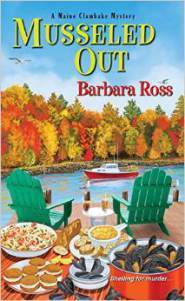 It’s been wonderful celebrating the release of Musseled Out this week with my Wicked sistahs. It’s been especially wonderful, because I’ve been doing it from my bed. Right before Malice Domestic, I did something excruciating to my knee. I’ve been mostly in bed with my leg up, with occasional breaks on the couch, with my leg up, ever since.
It’s been wonderful celebrating the release of Musseled Out this week with my Wicked sistahs. It’s been especially wonderful, because I’ve been doing it from my bed. Right before Malice Domestic, I did something excruciating to my knee. I’ve been mostly in bed with my leg up, with occasional breaks on the couch, with my leg up, ever since.
“How terrible. And you’re launching your book this week,” my friend Lucy Burdette said.
“Barb can launch a book from a horizontal position,” my friend Kate Flora reassured her.
After an extended pity party while everyone was a Malice, I realized Kate was right.
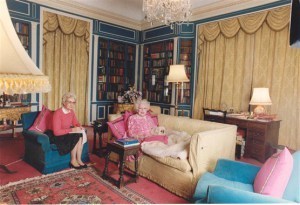
Barbara Cartland writing
In the past couple of weeks, I’ve visited Dru Ann’s Book Musings in the persona of my character Chris Durand. I’ve had a lovely chat with E. B. Davis over at Writers Who Kill. I had another conversation, this one over Skype, with Stephen Campbell at CrimeFiction.FM. And I shared a recipe for mussels at Mystery Lovers Kitchen and recipes for shrimp and lobster polenta and hot lobster dip on Kensington’s site.
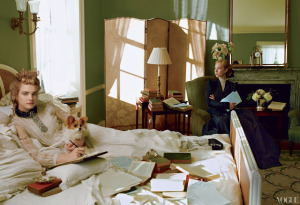
Edith Wharton writing in bed.
Note: This is a recreation. Though EW did write in bed, it’s hard to imagine her allowing herself to be photographed there.
Lots of people have weighed in with their reactions to Musseled Out, including Sandra Martin at RT Book Reviews, Katrina Niidas Holm at Crimespree Magazine, Dru Ann Love at Dru’s Book Musings, Mark Baker at Carstairs Considers, Beth Kannell at Kingdom Books and many others, (For a more complete listing, click here.)
Mystery writers who were first published in the era before mine often wax nostalgic for the days when authors were sent out on tours and there were many, many independent mystery bookstores to visit. I get caught up in that, too, because I still miss Kate’s Mystery Books just down the street from me. But now all I can say is, “Thank goodness things have changed.” I never could have gone on tour.
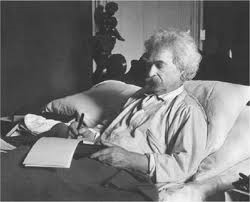
Mark Twain writing in bed
Do you think we’ll ever sit around reminiscing about the “good old days,” you know, when we used to launch a book using ezines, blogs, podcasts, e-mail newsletters and social media? The youngsters will probably roll their eyes and sigh at our old-fashioned notions.
Filed under: Barb's posts Tagged: Maine Clambake Mystery, musseled out

May 6, 2015
WICKED WEDNESDAY: MUSSELED OUT–It’s a Family Business
 Musseled Out is the third in the Maine Clambake series, and we are so glad that we are visiting the Snowden family again. Julia needs to save the family business once more, and she also needs to decide if she wants to stay in Maine. That made us think about small businesses, and the role they play in our lives. Wickeds, do you have any fond memories of a family owned or small business? Let us know!
Musseled Out is the third in the Maine Clambake series, and we are so glad that we are visiting the Snowden family again. Julia needs to save the family business once more, and she also needs to decide if she wants to stay in Maine. That made us think about small businesses, and the role they play in our lives. Wickeds, do you have any fond memories of a family owned or small business? Let us know!
Julie: I have a lot of small businesses, mostly family owned, that I go to every day. The hardware store down the street. The restaurant around the corner. The coffee shop (actually, three of them) near my office. But one small business I want to give a shout out to–our own Kim Gray (the Detective’s Daughter) own the Gift Cellar in Baltimore Maryland. What a great shop! I bought a wonderful pair of earrings there, and am planning my next visit soon!
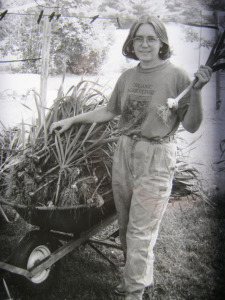 Edith: I also love Kim’s shop. I owned a small family business twenty years ago: the Five Star Organic Farm (here I am with my garlic crop one summer). It was both glorious and tough. Great to work outside on my own land when my sons were little, grow organic vegetables, sell to enthusiastic customers. But it was also tough, as any farming enterprise is: weather or critters can devastate a crop. Your lettuce wilts on the table at the farmers’ market. And the same issues arise as confront authors: the need to publicize, market, sell the concept of your business to bring in customers…and money. Not for the faint of heart! I finally decided to rejoin the hi-tech desk-job market. What will Julia decide?
Edith: I also love Kim’s shop. I owned a small family business twenty years ago: the Five Star Organic Farm (here I am with my garlic crop one summer). It was both glorious and tough. Great to work outside on my own land when my sons were little, grow organic vegetables, sell to enthusiastic customers. But it was also tough, as any farming enterprise is: weather or critters can devastate a crop. Your lettuce wilts on the table at the farmers’ market. And the same issues arise as confront authors: the need to publicize, market, sell the concept of your business to bring in customers…and money. Not for the faint of heart! I finally decided to rejoin the hi-tech desk-job market. What will Julia decide?
Sherry: Barbara’s books are so realistic that I keep forgetting I can’t really go on a Snowden family clambake! A couple of years ago I had an idea for a consumer product. I mentioned it to some close family friends and we joined forces. We started the patent process and fingers crossed it looks like it’s going to be approved.
Barb: Julie, I love this topic! I want to give a shout-out to a few family businesses that have been key to the Maine Clambake Mystery series. First of all, the Cabbage Island Clambakes. The Moore family who run them are nothing at all like the Snowdens, and Cabbage Island is not physically like Morrow Island, but visitors get the same delicious meal. Second of all, for Boiled Over, I visited Welch Blueberry Farm in Roque Bluffs, Maine, Downeast. The farm has been in the Hanscom family for four generations, and they also run a (very) small blueberry processing operation. 99% of wild blueberries are processed and frozen by large Canadian companies. Finally for Musseled Out, I went lobstering with Captain Clive Farrin. Lobstermen are the small businesspeople of the sea. The captains usually own their own boats, and they usually only go out for the day.
Jessie: I love to support local nurseries. Box stores sell seedlings, trees and shrubs but their plants can’t hold a candle to those grown with love, by people in the know, which can always be counted on to thrive in my tough climate. I eagerly await the open flag at my favorite local greenhouse, 4Js Earthworks, in Rochester, NH. The owner, Joan, always has a wide variety of herbs and heirloom vegetables along with a beautiful palate of perennial and annual flowers.
Liz: I haven’t had a chance to get to Kim’s shop yet, but it’s on my list! Although I do have a lovely wine glass that Edith got me there. I have a soft spot for family-owned businesses also. My father used to run a driving school (and for those who’ve driven with me, you can attest that our idea of driving is VERY different). Although that’s not a business that’s remained in the family, I saw how important it was for the community to get behind you. Today, my favorite local business is the Devon Point Farm, where we get a summer farm share. It’s such a great atmosphere to go there and see how the owners and their children live and work, and the veggies are some of the best I’ve ever had. Looking forward to this year’s kicking off!
Readers, what’s your favorite local business?
Filed under: Book Release Tagged: 4Js Earthworks, Barbara Ross, clambake, farm share, Gift Cellar, local, Maine Clambakes, nurseries, patents, plants, small businesses, vegetables

May 5, 2015
Happy Book Birthday Barbara Ross!
 YAY! The third Maine Clambake mystery is out! Happy Book Birthday Musseled Out.
YAY! The third Maine Clambake mystery is out! Happy Book Birthday Musseled Out.
Here’s a bit about the book: The busy summer tourist season is winding down in Busman’s Harbor, Maine, but Julia Snowden senses trouble simmering for the Snowden Family Clambake Company. Shifty David Thwing–the “Mussel King” of upscale seafood restaurants–is sniffing around town for a new location. But serving iffy clams turns out to be the least of his troubles. . .
When Thwing is found sleeping with the fishes beneath a local lobsterman’s boat, the police quickly finger Julia’s brother-in-law Sonny as the one who cooked up the crime. Sure, everyone knows Sonny despised the Mussel King. . .but Julia believes he’s innocent. Proving it won’t be easy, though. It seems there’s a lot more than murder on the menu, and Julia needs to act fast. . .
Wickeds, what do you love most about this series?
Julie: Barb really nails the setting in Maine, and I love that. It is such a unique part of the country, and I feel like she gives us a real taste of it. I also love the cover art. A LOT.
Sherry: They just keep getting better, Barb! I love Mussled Out — the climactic scene is so exciting I held my breath! And can’t wait for number four!
Edith: I love the characters. Julia Snowden with her conflicts about coming home. Gus and his no-nonsense approach to life. Her sister, Livvie, and their mom. The somewhat mysterious hunk of a love interest. And everybody else – deeply drawn, intriguing, everybody with some conflict. Just like real people. Can’t wait to read it, Barb!
Jessie: My great-grandparents were lobstermen and when I was a child we visited them once a month. They’ve been gone now for many years but because of the setting and the family focus,when I read these books I feel a bit like I am having a visit with them once more. Thanks, Barb!
Liz: I love this series!! I used to spend a lot of time in Maine and these books are like memories. Can’t wait to read it Barb!
Barb: Thanks all! I so appreciate your book birthday wishes, I really do. But my favorite, favorite book birthday wishes are from the little girl below. You can understand that, right?
Readers: What’s your favorite part of the series?
Filed under: Book Release Tagged: Boothbay Harbor Maine, clambakes, Kensington Publishing, maine, musseled out


May 4, 2015
The Poem You Can’t Forget
by Sheila Connolly
The lovely poem that Edith cited here not long ago reminded me of another poem which seems particularly appropriate for writers. It’s a villanelle by Sylvia Plath, called “Mad Girl’s Love Song.” It’s always stuck in my mind because of one of the recurring lines (as in Edith’s poem), “(I think I made you up inside my head.”) Yes, the parentheses are part of the line as Plath wrote it.
In case you’re wondering, a villanelle is: a nineteen-line poetic form consisting of five tercets followed by a quatrain. There are two refrains and two repeating rhymes, with the first and third line of the first tercet repeated alternately until the last stanza, which includes both repeated lines. (Never heard of a tercet. For us simple folk it’s three lines together.) It’s clearer when you see it on a page than in the definition.
In college my daughter, who had never been much of a reader in high school, somehow morphed into an English major, combining contemporary literature and Old English literature, a double major that no one had ever attempted. She became involved in the campus poetry organization, which hosted visiting poets (she met Seamus Heaney once, and on another occasion my husband and I attended an event where Gary Snyder spoke and marveled at the red velvet cake that my daughter had made for the event—apparently he’d never seen one before.)
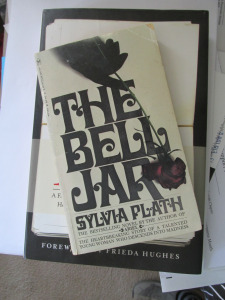
My original copy
Sylvia Plath attended the same college as my daughter, so she still has a presence there. She occupies an interesting place in contemporary writing. I read The Bell Jar just after college myself (and I still have that copy, a 7th printing from 1972), my daughter a generation later (the same copy, I think). Together we made a pilgrimage to the Massachusetts house which Plath immortalized when she tried to kill herself under the porch (as described in The Bell Jar; yes, we found it, and it’s not far from the similarly bland suburban house where poet Anne Sexton did manage to commit suicide in the garage. Apparently the combination of poetry and Massachusetts can be toxic, although Heaney survived at Harvard for a while.). Plath’s life was brief and dramatic, and that colors this poem.
The other recurring line in Plath’s villanelle is “I shut my eyes and all the world drops dead.” (No parens this time.) To me the two lines, alternating, say a lot about how we as writers think: We make up worlds in our heads. When we shut our eyes, we see those imaginary worlds, not the real one we live in. If we’re lucky and/or skilled, we can set those worlds on a page and makes others see them too.
Plath’s real world proved to be too much for her. Is it depression when a writer can no longer tell where the line between imagination and reality lies? Or when the internal images become more frightening than the reality, or conversely, not enough to offset the grimmer reality?
Maybe that’s why we write cozies. We can create imaginary worlds where there is little violence, plenty of nice, helpful, kind and supportive people, and always a happy ending. Is this fantasy? Of course it is. But it makes people happy. And what’s wrong with that?
Are there any lines from a book or a poem that you’ve never been able to forget?
And now for a bit of self-promotion: my latest book, Defending the Dead, the third in the Relatively Dead series. My protagonist Abby Kimball, who sees through the eyes of her ancestors, decides to take on the witchcraft trials in Salem. That’s a subject I had always wanted to find time to explore myself–and I think a lot of people have failed to understand it. You may find some surprises.
Available in e-format from Amazon, Barnes and Noble, and iBookstore.
Filed under: Sheila's Posts Tagged: sheila connolly

May 1, 2015
The Wickeds Do Malice
Malice Domestic is a great conference, and most of the Wickeds will be there! We are THRILLED that two of our own are nominated for Agatha awards (Edith for Best Short Story and Sherry for Best First Novel). We will be on social media all weekend, so make sure to follow us on Facebook or on Twitter.
Here’s our schedule, but we’ll also be around all weekend. Please stop any one of us and say hello! We love meeting people in 3-D. If you see our Fan of Honor, please pose with her as well.
Friday
10:00-11:45—Malice Go Round. Liz will be representing the Wickeds at this fun event! Haverford Baccarat
1:00-1:50—New Kids on the Block: Our Agatha Best First Novel Nominees panel—Sherry—Waterford/Lalique
5:00-5:30—Opening Ceremonies—Waterford/Lalique room Sherry and Edith will get their certificates–we wouldn’t miss that!
7:30—Charity auction. The Wickeds have a basket in the Silent Auction.
Saturday
7:30-9:00—SinC Breakfast
9:00-9:50 Edith on Make It Snappy: Our Agatha Best Short Story Nominees panel
10:00-10:50—Susannah on the It’s All Relative: Dysfunctional Families panel
2:00—2:50 Julie moderates the Knit One, Murder Too: A Crafty Compendium of Craft-Based Mysteries panel
7:00 Banquet—Chrystal Ballroom
Sunday
7:00-8:45—New Authors breakfast. Sherry introduced.
9:00-9:50—Jessie on Population 2000: Small Town Sleuths panel.
11:45-12:35—Sheila on Bright Lights/Starry Nights: Big City to Small Town Sleuths panel. Liz on Murder’s on the Menu: Food and Mysteries panel.
There are, of course, dozens of authors at Malice Domestic. Here’s the rest of the schedule. We are excited about being in Bethesda this weekend–we’ll let you know how it went really soon!
Filed under: Uncategorized Tagged: Malice Domestic

April 30, 2015
Celebrating Two Wicked Years!
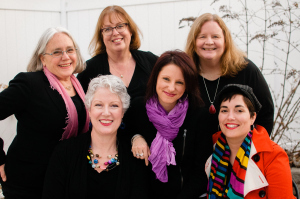 It seems impossible that two years have passed since we started Wicked Cozy Authors. Our very first post was about how we met. For our first year anniversary we interviewed each other. We’d like to say how grateful we are for all our fabulous readers and our regular commenters. Thank you! We love you! And we are each going to give away a book (or perhaps a mug) to six commenters today. So this year Wickeds, tell us one thing that has changed for you this year and one thing you don’t think the other Wickeds know about you.
It seems impossible that two years have passed since we started Wicked Cozy Authors. Our very first post was about how we met. For our first year anniversary we interviewed each other. We’d like to say how grateful we are for all our fabulous readers and our regular commenters. Thank you! We love you! And we are each going to give away a book (or perhaps a mug) to six commenters today. So this year Wickeds, tell us one thing that has changed for you this year and one thing you don’t think the other Wickeds know about you.
Sherry: My dream of getting published became a reality last December but it took awhile to sink in. I think because I know so many authors who are published it didn’t seem like a huge deal. About a month ago I was sitting on the couch with my husband one evening and I thought, “I’m published. I AM PUBLISHED.” What don’t the Wickeds know about me —-hmmm. When I was the Director of Marketing for a financial planning company I did weekly stock market reports on a local radio station. I have a good radio voice — which is very different from my regular voice.
Edith: What a fabulous path we’ve been on together! And Sherry, I want a demo of your announcer voice while we’re in Bethesda! For me, in the last year my Local Foods Mysteries contract was extended for two more books, and I landed both the Country Store Mysteries contract and the Quaker Midwife Mysteries contract. This change is both terribly exciting, and very stressful. So far, the books are still flowing out of my fingers. But I have some pretty tight deadlines next year. Gulp. Something you don’t know about me: I was the first human voice to be  recognized by one of the first commercial speech recognition companies. Thirty-one years ago I was employee #16 for Kurzweil Speech Systems (the stars of which finally landed with Nuance, of Dragon Naturally Speaking), and I recorded 8000 words twice. I was the only person the system recognized, so I did all the demos and traveled to conventions. Not the best use of a PhD in linguistics, but it was fun. (Somewhere I have a picture of me that appeared in something like Newsweek!)
recognized by one of the first commercial speech recognition companies. Thirty-one years ago I was employee #16 for Kurzweil Speech Systems (the stars of which finally landed with Nuance, of Dragon Naturally Speaking), and I recorded 8000 words twice. I was the only person the system recognized, so I did all the demos and traveled to conventions. Not the best use of a PhD in linguistics, but it was fun. (Somewhere I have a picture of me that appeared in something like Newsweek!)
Jessie: My experience over the past year has been similar to Sherry’s. I’ve been published since 2010 but I work at home and five years ago I had children that were younger and needed more from me. I also had fewer work obligations like speaking engagements or teaching commitments. Over the past year I have come to realize this writing gig is an actual job and that I am a professional writer. I don’t know why it has taken so long for this to feel real but I am enjoying thinking about myself in a new way. As to what the Wickeds might not know about me? Perhaps it’s that before my youngest child was born I was a garden designer.
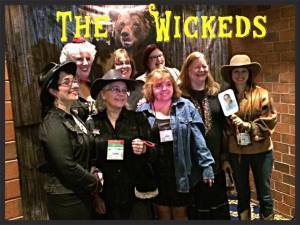 Liz: This past year has been amazing for me also. My Pawsitively Organic Mysteries have been extended for three more books, and I have a new series under contract also that will be out in 2016. Truly blessed, if not stressed! What the Wickeds don’t know about me: I did some radio during my journalism stint. I was the special guest the morning after every city council meeting to talk about what was going on in town. At the time I didn’t care for it, but now I appreciate what it taught me!
Liz: This past year has been amazing for me also. My Pawsitively Organic Mysteries have been extended for three more books, and I have a new series under contract also that will be out in 2016. Truly blessed, if not stressed! What the Wickeds don’t know about me: I did some radio during my journalism stint. I was the special guest the morning after every city council meeting to talk about what was going on in town. At the time I didn’t care for it, but now I appreciate what it taught me!
Julie: This past year I met my first deadline, and am plugging away on the details surrounding Just Killing Time getting published October 6. I was also co-chair of the New England Crime Bake, a job which I have again this year. It has been a wonderful year in my writing life, that’s for sure. What the other Wickeds don’t know about me? I love cotton candy. LOVE IT.
Barb: Is today really the day? Because two years ago today, something extra special happened, I became a grandmother for the first time to an absolutely amazing baby girl. It’s been a great year professionally. I handed in Musseled Out in July and the Maine Clambake series was renewed for three more books in August. At Level Best Books, we published Best New England Crime Stories 2015: Rogue Wave in November. As to what you don’t know about me, seriously after all these years of blogging, I don’t have any secrets left.
Readers: What’s something about yourself you think we don’t know? Remember, we are going to give away a book (or perhaps a mug) to six commenters today.
Filed under: Group posts Tagged: Dragon Naturally Speaking, garden design, Kurzweil Speech Systems, Nuance, Quaker Midwife Mysteries, Ray Kurzweil

April 29, 2015
Wicked Wednesday: Sports — love em or leave em?
Anyone who has lived in New England knows the four seasons, Bruins, Celtics, Red Soxs and Patriots. Wickeds, do you follow sports? Have a favorite sport? Have a favorite team? (If any of you say the Yankees you’ll immediately be tossed out on your ear…)
Liz: I am so NOT a sports girl. Of course, I’ll root for the New England teams, celebrate wins and lament losses. But ask me to watch? No thanks. And if I hear one more sports analogy at work….
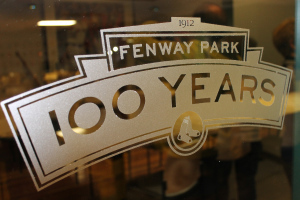 Barb: When I moved to New England, I was so naive, I thought baseball was played once a week, like football. I’m more educated now, thanks to my Red Sox-loving husband. I love Fenway Park. There is no place like it on a summer evening. And baseball on the radio while I read on a summer night. Same with a Patriots open practice on a summer evening. But don’t ask me to watch sports on TV. It shrinks down the spectacle. (I feel the same way about opera.) I will, however, ardently defend the local teams in any situation where they need defending. That’s what being a New England fan means.
Barb: When I moved to New England, I was so naive, I thought baseball was played once a week, like football. I’m more educated now, thanks to my Red Sox-loving husband. I love Fenway Park. There is no place like it on a summer evening. And baseball on the radio while I read on a summer night. Same with a Patriots open practice on a summer evening. But don’t ask me to watch sports on TV. It shrinks down the spectacle. (I feel the same way about opera.) I will, however, ardently defend the local teams in any situation where they need defending. That’s what being a New England fan means.
Jessie: I only watch the Olympics and the World Cup. And really, I only watch those because I like to create regionally themed snacks. For me, the highlight of the games is to plan menus to celebrate the food cultures of the opposing teams. If Korea was playing Sweden I might make Kimbap and Smorgastarta. I’m already planning for coxinhas and caipirinhas when the Olympics are in Brazil in 2016!
 Sherry: Bob and I will be up to watch the Olympics with you Jessie! I love sports. Growing up in Iowa it was all Cubs, Cardinals, and Bears. I live in Colorado when John Elway joined the Broncos and I fell in love with them. When we moved to Massachusetts I went to my first hockey game expecting to hate it but enjoyed the game. And there is nothing like a game at Fenway. My husband has me hooked on English Premier league soccer. Go Manchester United.
Sherry: Bob and I will be up to watch the Olympics with you Jessie! I love sports. Growing up in Iowa it was all Cubs, Cardinals, and Bears. I live in Colorado when John Elway joined the Broncos and I fell in love with them. When we moved to Massachusetts I went to my first hockey game expecting to hate it but enjoyed the game. And there is nothing like a game at Fenway. My husband has me hooked on English Premier league soccer. Go Manchester United.
Edith: I’m not a sports fan. Neither my father nor my brother was interested in any sport as I grew up, and definitely not my mom or my sisters, although my grandparents would follow the World Series, and as a high-achieving student in high school, I won a ticket to see Sandy Koufax pitch at Dodger Stadium in Los Angeles. But I live with a Red Sox fanatic, and I apparently raised one, too, so how can I not follow baseball with them? Funny, Barb, for years listening to baseball on the radio was just noise to me. I couldn’t even figure out what they were saying. The last time the Sox were in the World Series, though, I was driving home from Boston alone during a game and I turned on the game. Lo and behold, it suddenly made sense!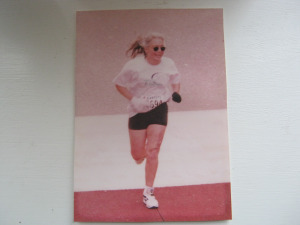
I love watching the Olympics, but my annual sport is following, anticipating, and watching the Boston Marathon. I even ran it (with a charity number) in 1986, finishing in 5 hours 16 minutes. Accomplishment of a lifetime! (Although if I win the Agatha Saturday night, those two will come close to a tie.)
Julie: I am a HUGE Red Sox fan. Huge. I love baseball season, and games are often the background music to my writing.
Readers: What’s your sport? Micro-local, regional favorite, or national team? Or maybe your sport is more on the order of lifting a margarita on the deck while reading the latest cozy mystery? We want to know!
Filed under: Wicked Wednesday Tagged: Bears, Boston Marathon, Broncos, caipirinhas, Cardinals, coxinhas, Cubs, Dodgers, English Premier league soccer, kimbabp, Manchester United, olympics, Sandy Coufax, smorgastarta, world cup

April 28, 2015
Welcome Back Chrystle Fiedler, Author of the Natural Remedies Mysteries!
Liz here, welcoming back Chrystle Fiedler, who writes the Natural Remedies Mysteries. Garden of Death is her latest – and she’s giving away two copies of the book to commenters!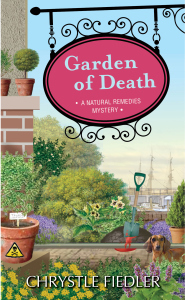 You all know me and my obsession with everything natural, healthy and organic, so naturally I love these books. Flowers are one natural healing area I don’t know well, so I’m delighted Chrystle’s stopping by to share her knowledge. Take it away, Chrystle!
You all know me and my obsession with everything natural, healthy and organic, so naturally I love these books. Flowers are one natural healing area I don’t know well, so I’m delighted Chrystle’s stopping by to share her knowledge. Take it away, Chrystle!
Flower Power:
The Gardens of England and Medicinal Plants that You Can Grow and Use!
By Chrystle Fiedler
After a very cold, very white and very long winter on Long Island in New York, I was more than ready for spring to arrive with its warm breezy weather and beautiful blooming flowers and medicinal plants. My passion for flowers comes from my mother, Marion who was always outside tending her garden in the spring and summer. My mother actually grew up down east in East Machias, Maine, so I have a natural connection to all of you Wicked Cozy Authors from New England! I also attended college at Boston University and spent 4 years in Beantown, getting my degree in communications.
In 2008 I planned a trip so that my mother and I could visit the gardens in Englan d. We were to fly over the week after the 4th of July but then she got sick and couldn’t come (she’s okay now!). At the last minute, I decided to go anyway and I’m really glad that I did. I’d been to London before and I feel at home there.
d. We were to fly over the week after the 4th of July but then she got sick and couldn’t come (she’s okay now!). At the last minute, I decided to go anyway and I’m really glad that I did. I’d been to London before and I feel at home there.
 For my first stop, I took the tube to the Hampton Court Flower Show, where I was wowed by the amazing displays and uses of flowers.
For my first stop, I took the tube to the Hampton Court Flower Show, where I was wowed by the amazing displays and uses of flowers.
Here are three of my favorites: 

Even though it was raining it was all so beautiful! The show takes place on the parklands surrounding Henry VIII’s castle right next to the River Thames where I believe that Wolf Hall on Masterpiece was filmed in part.

Next I visited the Chelsea Physic Garden in London. Established in 1673 by the Worshipful Society of Apothecaries for its apprentices to study the medicinal qualities of plants, it’s mission is to demonstrate the importance of medicinal and herbal plants to health and well-being. Over 50,000 visitors pass through the gates each year.
I was especially intrigued by the section that featured a variety of plants for different health conditions. 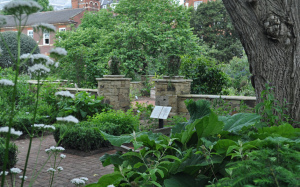 Years later, I was able to put my inspiration to good use, both in my non-fiction, and in latest installment of my natural remedies mystery series, the Garden of Death.
Years later, I was able to put my inspiration to good use, both in my non-fiction, and in latest installment of my natural remedies mystery series, the Garden of Death.
Medicinal plants can be very effective when it comes to common complaints, so here are 5 plants mentioned in the Garden of Death that you may want to consider growing and using. Usually, natural remedies like these are perfectly safe, but it’s best to discuss their use with your doctor first. I hope that you enjoy learning about beneficial plants!
Botanica Name: Aloe barbadensis
Medicinal Uses: Aloe is a handy plant that no household should be without. This juicy, succulent plant features spiky leaves that contain a thick gel that you can use topically to soothe and heal minor burns, sunburns and blisters and prevents scarring. You can also use it for insect bites, rashes, acne and other skin conditions like eczema, poison ivy and poison oak. Place this hardy plant on your kitchen window sill or plant in your garden. Just make sure your aloe plant has sunshine, well-drained soil, and moderate water and then, watch it grow and reap the many benefits it provides!
 Chamomile
Chamomile
Botanical Name: Chamaemelum nobile (Roman chamomile; syn. Anthemis nobilis), Matricaria recutita (German chamomile; formerly Chamomilla recutita; syn. M. chamomilla)
Medicinal Uses: Since the times of ancient Greece, both types of chamomile have been used medicinally in the same ways. Tiny but mighty, chamomile is rich in nerve and muscle relaxing nutrients such as calcium, magnesium, potassium and B vitamins that help promote relaxation, easing stress and anxiety, encouraging the movement of chi or good energy, and promotingsleep. It is has also been approved for use by the pharmacopoeias in many countries to treat inflammation, indigestion, muscle spasms, and infection. Chamomile is a useful herb those that are “bothered by almost everything.”
Garlic 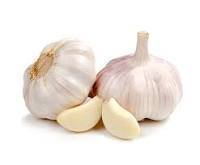
Botanical Name:
Allium sativum
Medicinal Uses: Garlic is an edible bulb from a plant in the lily family, and one of the superstars of medicinal plants. It has been used as both a medicine and a spice for thousands of years. Antiseptic, antibacterial and antimicrobial, garlic stimulates the production of white blood cells, improving immunity and helping to speed healing from colds and flu. There is a reason Grandma’s Chicken soup makes you feel better! Garlic also is effective at lowering high cholesterol and lowers blood sugar levels. You can eat garlic cloves raw if you’re feeling brave or add them to your next soup or stir fry.
Borage
Botanical Name: Borago officinalis
 Medicinal Uses: Borage leaves, flowers, and seed oil can help you feel happier and can even, inspire courage. That’s why in medieval times these flowers were embroidered on the mantles of knights and jousters, Borage was even sneaked into the drinks of prospective husbands to give them the courage to propose!
Medicinal Uses: Borage leaves, flowers, and seed oil can help you feel happier and can even, inspire courage. That’s why in medieval times these flowers were embroidered on the mantles of knights and jousters, Borage was even sneaked into the drinks of prospective husbands to give them the courage to propose!
Borage leaves and flowers have long been used in treatments for anxiety, mild depression, grief, heartbreak and worry. As a flower essence, borage is used to lighten mild depression and ease discouragement. Borage helps bring joy, optimism, enthusiasm, and good cheer, improves confidence, and dispels sadness.
Calendula 
Botanical Name:
Calendula officinalis
Medicinal Uses: Calendula is a hardy, long blooming plant with radiant yellow flowers that will brighten your garden. But there’s more. Calendula also has amazing healing properties. Antiseptic and anti-inflammatory, this flower helps to promote cell repair and growth. You’ll find calendula in many items at your health food store such as lotions, salves and creams that treat everything from cuts and scrapes, to insect bites, varicose veins and Athlete’s foot. Calendula also is a nourishing and cleansing tonic for the lymphatic system, which helps to improve immunity. It also aids digestion, helps to ease throat infections, and is used in children’s ear drops. Inside and out, this is a helpful herb that speeds healing and improves health.
PHYSICIAN, HEAL THYSELF?
Suspicion is unearthed when an outspoken surgeon turns up dead in Willow McQuade’s medicinal herb garden.
A bitter battle has sprouted in the village of Greenport on the eve of the annual maritime festival: Willow McQuade has transformed a vacant lot alongside Nature’s Way Market & Café into a beautiful garden of healing plants—as much a tribute to her late aunt Claire, the shop’s beloved founder, as an enlightening educational center. The town board awarded Willow the plot fair and square, but that’s not how some folks see it—including Dr. Charles White, who invested in plans to develop a high-end hotel on the property. When the belligerent surgeon publicly threatens Willow during the festival, Willow’s boyfriend, Jackson Spade, ratchets up the hostile confrontation to defend the woman he loves, sowing seeds of guilt that take root by the time Dr. White’s corpse turns up amongst Willow’s chamomile and ashwaganda plants. To prove Jackson’s innocence, she must dig deep to bring a killer to light.
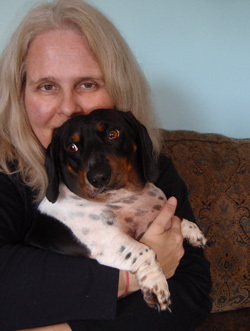 CHRYSTLE FIEDLER is the author of the previous Natural Remedies mysteries, Scent to Kill, and Death Drops, as well as six nonfiction books on natural healing and herbal remedies. Also a freelance journalist specializing in alternative health topics, her work has appeared in Natural Health, Spirituality & Health, Mother Earth Living, Green Living, Better Homes & Gardens, Prevention, Vegetarian Times, and Remedy. She lives in Greenport, New York with her 3 dachshunds and 2 cats, three of which are rescues. Visit www.chrystlefiedler.com, or follow her on Facebook, and Twitter.
CHRYSTLE FIEDLER is the author of the previous Natural Remedies mysteries, Scent to Kill, and Death Drops, as well as six nonfiction books on natural healing and herbal remedies. Also a freelance journalist specializing in alternative health topics, her work has appeared in Natural Health, Spirituality & Health, Mother Earth Living, Green Living, Better Homes & Gardens, Prevention, Vegetarian Times, and Remedy. She lives in Greenport, New York with her 3 dachshunds and 2 cats, three of which are rescues. Visit www.chrystlefiedler.com, or follow her on Facebook, and Twitter.
Readers, any experiences with flowers as remedies? Leave a comment below for a chance to win a copy of Garden of Death!
Filed under: Guest posts Tagged: Chelsea Physic Garden, Chrystle Fiedler, flowers, Garden of Death, gardens, healing, herbs, London, Natural Remedies Mysteries

April 27, 2015
Welcome Back to the Agatha-Nominated Lea Wait!
by Barb who is busy rounding up her stuff to pack for Malice.
 In the past several months, Lea Wait has visited the Wicked Cozies twice, once for her Shadows Mysteries and once for her new Mainely Needlepoint series.
In the past several months, Lea Wait has visited the Wicked Cozies twice, once for her Shadows Mysteries and once for her new Mainely Needlepoint series.
Now she’s back to tell us about her Agatha-nominated novel for children, UNCERTAIN GLORY. I love this book, and I also wanted to ask Lea some questions about the mysterious (for me) world of writing for children.
Here’s the blurb for UNCERTAIN GLORY.
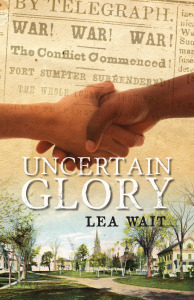 Joe Wood has dreams. Big dreams. He wants to be a newspaperman, and though he’s only fourteen, he’s already borrowed money to start his own press. But it’s April, 1861, and a young nation is teetering on the brink of a civil war. As effects of war begin to spread over Joe’s hometown of Wiscasset, Maine, he must juggle his personal ambitions with some new responsibilities. He has to help Owen, his young assistant, deal with the challenges of being black in a white world torn apart by color. He needs to talk his best friend, Charlie, out of enlisting. He wants to help a young spiritualist, Nell, whose uncle claims she can speak to the dead. And when Owen disappears, it’s up to Joe to save him. Lea Wait skillfully draws on the lives of real people in Maine’s history to tell this story of three young adults touched by war and the tension it brings, forcing them into adulthood—before they may be ready.
Joe Wood has dreams. Big dreams. He wants to be a newspaperman, and though he’s only fourteen, he’s already borrowed money to start his own press. But it’s April, 1861, and a young nation is teetering on the brink of a civil war. As effects of war begin to spread over Joe’s hometown of Wiscasset, Maine, he must juggle his personal ambitions with some new responsibilities. He has to help Owen, his young assistant, deal with the challenges of being black in a white world torn apart by color. He needs to talk his best friend, Charlie, out of enlisting. He wants to help a young spiritualist, Nell, whose uncle claims she can speak to the dead. And when Owen disappears, it’s up to Joe to save him. Lea Wait skillfully draws on the lives of real people in Maine’s history to tell this story of three young adults touched by war and the tension it brings, forcing them into adulthood—before they may be ready.
Barb: Lea, all your historical fiction for young people takes place in or involves the town of Wiscasset, Maine. Why did you decide on this unifying sense of place? And how do you use it in your books?
 Lea: I’ve always been fascinated by places. How different they are, and, most important, what stays the same (mountains, rivers, rocks) and what changes (the way people live – their homes, occupations, how they think of their environment). When I sit on the rocky shore of Maine I know I’m sitting on the same rocks people sat on hundreds – perhaps thousands – of years ago.
Lea: I’ve always been fascinated by places. How different they are, and, most important, what stays the same (mountains, rivers, rocks) and what changes (the way people live – their homes, occupations, how they think of their environment). When I sit on the rocky shore of Maine I know I’m sitting on the same rocks people sat on hundreds – perhaps thousands – of years ago.
Who were they? What were they thinking
So I wanted to write a group of books that reflect one place, over time. I chose the town of Wiscasset, Maine, and so far have had five books published that take place in the 19th century there – in 1806, 1804-1807, 1819-1820, 1838 and, in UNCERTAIN GLORY, 1861. Many of the characters in these books actually lived in 19th century Wiscasset, and many events in the books took place there.
Barb: In UNCERTAIN GLORY your main character, Joe Wood, faces many conflicts and responsibilities that today would be considered adult. How do your young readers react to this? What do they learn from it?
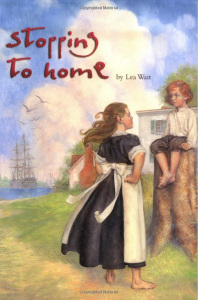 Lea: Although Joe is a real person, in all of my books the main characters (ages 11-15) are faced with major changes in their lives, and must make decisions as to what they’ll do, where they’ll live, who they’ll live with, etc … decisions which many people today don’t make until their twenties. Because of that, my books are different from some contemporary stories for children which focus on school days and friends. My characters have friends, but they may also have business partners, and they definitely have major responsibilities, for themselves and their families.
Lea: Although Joe is a real person, in all of my books the main characters (ages 11-15) are faced with major changes in their lives, and must make decisions as to what they’ll do, where they’ll live, who they’ll live with, etc … decisions which many people today don’t make until their twenties. Because of that, my books are different from some contemporary stories for children which focus on school days and friends. My characters have friends, but they may also have business partners, and they definitely have major responsibilities, for themselves and their families.
Children reading my books are often amazed at what was expected by young people in the past, but are also fascinated by it. (So are adults!)
Barb: You have two mystery series for adults. How is writing for young people different from writing for adults?
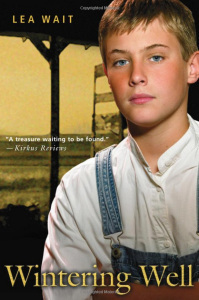 Lea: It’s not as different as you might think. There are a few “rules” – say, about the ages of the main characters in books for young people. And in middle grade fiction, which I write, there’s no swearing or sex. Of course – in cozy mysteries you have rules, too – you can’t hurt an animal or a child, and most violence and sex take place off-stage. So each genre has its framework.
Lea: It’s not as different as you might think. There are a few “rules” – say, about the ages of the main characters in books for young people. And in middle grade fiction, which I write, there’s no swearing or sex. Of course – in cozy mysteries you have rules, too – you can’t hurt an animal or a child, and most violence and sex take place off-stage. So each genre has its framework.
I don’t write down in my children’s books. I use whatever the (period-appropriate) words are, and my plots have included the middle passage from Africa, amputation, death of relatives and friends, and serious mental and physical disabilities. (Not all in one book!) In UNCERTAIN GLORY there are financial issues, a parent depressed after the death of a son, bullying, racial prejudice, and a twelve-year-old girl spiritualist who is being drugged by her uncle.
I don’t always deal with issues like that in my books for adults! I think authors (and parents) often under-estimate children. I’ve never heard of a child shocked by my books, but I know some parents and grandparents have been nervous about my subjects. I think sometimes we try to protect children too much. Think of what’s on the evening news!
Barb: A lot of people who don’t write for young people get confused by the categories. I understand picture books and chapter books, but help me through the thicket of juvenile, middle-grade, YA. Etc.
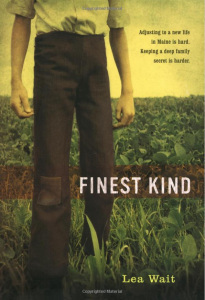 Lea: Okay! There are pictures books for every age group, up to adults. (What else is a coffee table book?) They start with board books, and gradually add words and pictures. Most picture books for the pre-school set today have under one thousand words. Chapter books also can be divided by reading level, but basically are books for early readers that look more grown up – fewer pictures than picture books, and the story divided into half a dozen or more chapters.
Lea: Okay! There are pictures books for every age group, up to adults. (What else is a coffee table book?) They start with board books, and gradually add words and pictures. Most picture books for the pre-school set today have under one thousand words. Chapter books also can be divided by reading level, but basically are books for early readers that look more grown up – fewer pictures than picture books, and the story divided into half a dozen or more chapters.
I write middle grade fiction, which are the classic “children’s books,” aimed at ages 8-14. They’re a little shorter than books for adults (30,000-45,000 words) and the main characters are usually aged 11-14. Young Adults, or YA books, have main characters aged 15-19, and more words. If the characters are older than nineteen, the books are now categorized as “New Adult.”.
In reality – a lot of YA and NA and even middle grade fiction is bought and read by adults, and children choose books by a combination of their reading abilities and their interests – just as they always have.
Barb: How is selling a book for young people to a publisher different than selling a series for adults? How is supporting the book post-publication different?
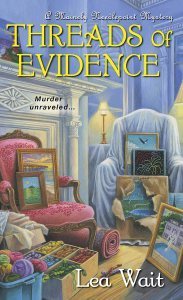 Lea: Wow. In lots of ways. First, most agents specialize; few agents place both books for adults and books for children. So you need to have an agent who knows the current marketplace in your genre. Second, in my experience books for children are edited much more closely than books for adults. Perhaps because of the time that takes, the time from selling a book until it’s published is longer than for adult books — for picture books (which are written by one person and illustrated by another) it can take five or six years until publication. For other books, two years is probably the average.
Lea: Wow. In lots of ways. First, most agents specialize; few agents place both books for adults and books for children. So you need to have an agent who knows the current marketplace in your genre. Second, in my experience books for children are edited much more closely than books for adults. Perhaps because of the time that takes, the time from selling a book until it’s published is longer than for adult books — for picture books (which are written by one person and illustrated by another) it can take five or six years until publication. For other books, two years is probably the average.
Different book reviewers look at books for children, and, just as there are mystery book stores, there are stores that specialize in children’s books. Most hard-cover books (and some soft covers) for children are purchased by town and school libraries; most parents can’t afford to buy their children stacks of new books, and depend on libraries. For that reason, having a children’s book re-published in a book club (with an inexpensive soft cover) is important for sales. Many authors make visits to classrooms to talk about their books, about being an author, and about how students can improve their research and writing skills. I’ve been doing more Skype visits in the past couple of years, too.
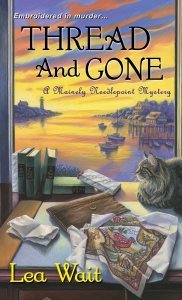 Barb: What are you working on now?
Barb: What are you working on now?
Lea: I just finished the third book in my Mainely Needlepoint series, THREAD AND GONE, which will be published next January. (The second in the series, THREADS OF EVIDENCE, will be out in August.) I’m working on the eighth in the Shadows series. And I’m hoping to get back to one of the two books for young people that seem to be perpetually “in progress”. Not bored!
Barb: Wow. Certainly not. Good luck at the Agathas, Lea! We’ll see you at Malice.
Readers, how about you? What do you enjoy in a children’s or young adult novel? Anyone else have ambitions to write one?
Filed under: Guest posts Tagged: Agatha award, Books for children, Middle grade books, Uncertain Glory, Wiscasset Maine, Young adult books


